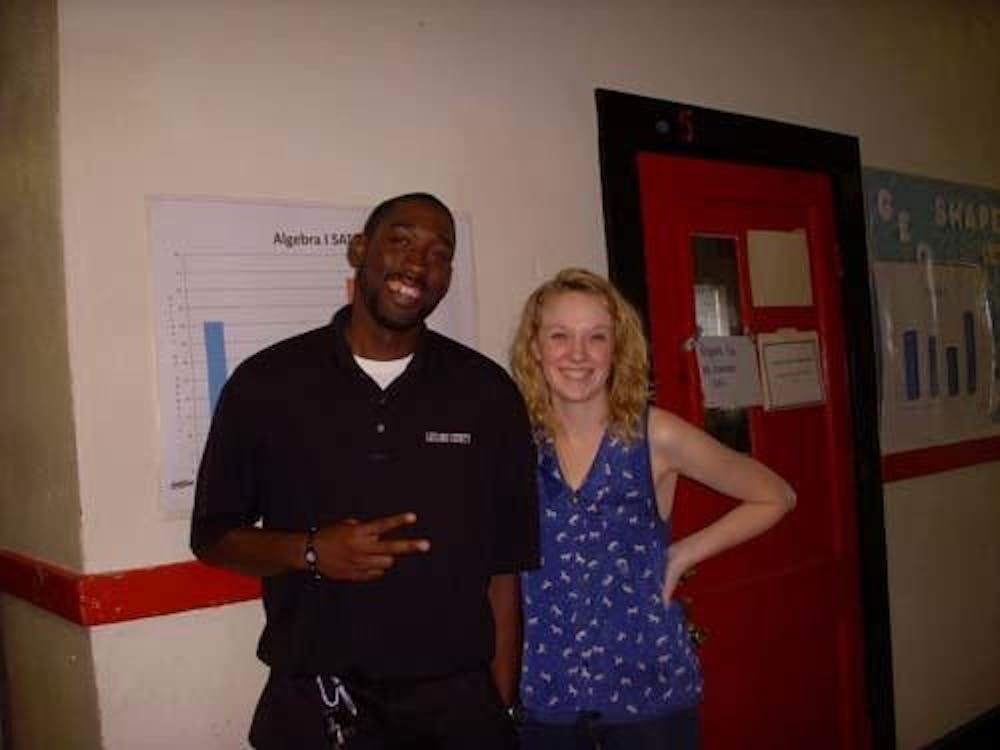Teach for America sends college grads to work on closing the achievement gap
TFA high school teacher and UP alumna Megan Osborn, right, teaches at Leflore County High School in the Mississippi Delta Region. At left is Carl Lucas, a fellow teacher. (Photo courtesy of Megan Osborn)
By Lydia Laythe Staff Writer laythe16@up.edu
A student from a low-income area has an eight percent chance of graduating college by age 24. A similar student from a high - income area has an 80 percent chance. The difference in achievements of students, in the U.S., based on income, neighborhood or race defines the achievement gap.
Teach for America (TFA) is a nonprofit organization committed to closing this gap. The program sends recent college graduates to teach in rural and urban public schools for two years. The application deadline for seniors applying this year is Feb. 15, but juniors can apply as early as Feb. 22.
Four 2011 UP grads are currently working with the program.
Megan Osborn, 2011 alum, has had a life-changing experience.
"I ended up forming really great relationships with my kids," she said.
Not all TFA applicants have backgrounds in education, and only one in six people who join TFA initially consider a teaching career.
Learning by doing
After being accepted, Osborn attended Institute, a crash course in teaching required for TFA members. Osborn, who has a B.A. in sociology, said Institute helped her realize that teaching was difficult.
"That was really overwhelming and extremely intimidating, and I thought I could just walk into it and be good at it - but I wasn't," Osborn said. "I wasn't good at it at all."
After Institute, TFA members move to their permanent locations.
Osborn is in the Mississippi Delta region working as a high school compensatory English teacher. Compensatory teachers instruct students who are below grade level in various academic subjects. Osborn said, on average, her ninth grade students read at a fourth grade level. Since her first day, 75 percent of Osborn's students gained two or more years in their reading abilities.
Finding ways to relate to her students was difficult for Osborn at first. The rural community she teaches in is small and mostly African American.
"I was convinced for the first few weeks that this was the hardest thing I'd ever done in my life," Osborn said.
But Osborn connected with her students by relaxing her strict disciplinary style.
"I let go of wanting to control things in my classroom, and tried to laugh and play with them, and treat them in a more motherly, nurturing sense," Osborn said.
Osborn learned to appreciate the chaos and energy her students brought to the classroom.
"My students are very rambunctious, talkative, disrespectful and loud," Osborn said. "And they're also very funny, creative, emotionally intelligent and perplexing."
Osborn is continuing for a third year.
"It's just funny. I've picked up their southern drawl and their slang and inflection," Osborn said. "I've been molded into the culture. The experience has changed me in so many beneficial ways."
On - Campus Involvement
Senior Megan House, TFA campus campaign coordinator at UP, works to raise awareness of TFA on campus. House said many people in the U.S. think everyone has equal access to education. Correcting misconceptions and answering questions are House's main goals.
"What kind of education you're getting is depending on how much money you have or what race you are," House said.
Cara Benny, TFA recruitment specialist, is based locally and works with several colleges in the Portland area.
"So many students graduating from college have the skills and the potential to make a really big impact with kids," Benny said. "This is an opportunity to get a lot of really talented individuals into the classroom."








